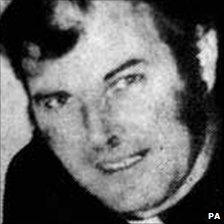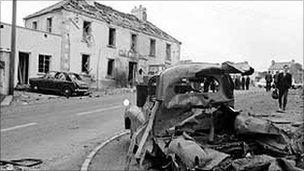Who was Father James Chesney?
- Published

Father Chesney was a priest in County Londonderry in 1972
The Police Ombudsman for Northern Ireland has released his long awaited report into the Claudy bombing which killed nine people in July 1972.
In it, he has effectively confirmed what many have believed for 38 years - a Catholic priest was involved in carrying out the atrocity and that the police, British government and Catholic Church conspired to keep that fact a secret.
The report said that police in 1972 believed that Father James Chesney was the IRA's director of operations in south Derry and was directly involved with the Claudy bombings.
However, the police force at the time, the Royal Ulster Constabulary, never brought Fr Chesney in for questioning.
Fr Chesney was the curate in Cullion, one of the smallest parishes in County Londonderry, near the village of Desertmartin.
Ombudsman investigators spoke to a former Special Branch detective who said he had wanted to arrest Fr Chesney in 1972, but was told by an assistant chief constable (ACC) that matters were in hand.
That same ACC then wrote to the Northern Ireland Office asking what action "could be taken to render harmless a dangerous priest".
He asked would it be possible to bring the subject up with cardinals or bishops.
In December 1972, a NIO official wrote back to the ACC to say that the matter had been discussed by the Northern Ireland Secretary Willie Whitelaw and Cardinal Conway, the head of the Catholic Church in Ireland.
The letter read: "The Cardinal said that he knew the priest was a very bad man. The Cardinal mentioned the possibility of transferring him to Donegal."
The then RUC chief constable, Graham Shillington, said he would prefer a "transfer to Tipperary".
Fr Chesney was moved to a parish in County Donegal in 1973, he died in 1980.
No paramilitary group has ever claimed responsibility for the bombing and no one has ever been convicted of it, but for more than 30 years rumours circulated that a Catholic priest and the IRA were behind the attack.
When the investigation into Claudy was re-opened in 2002, part of its remit was to investigate claims that the British government, RUC and the Catholic Church conspired to cover up the activities of the priest.
The Police Service of Northern Ireland said that a search of papers from 1972 indicated that a priest in south Derry had been an active member of the IRA.
They did not name him, but few doubted the priest in question was Fr Chesney.
Rural curate
Claudy, a small village in the Sperrin Mountains, was seemingly a world away from the violence of Belfast and Derry.
In the wake of the bombing, allegations began to surface that Fr Chesney was an active member of the IRA's South Derry brigade.
It was claimed he had joined the republican movement in anger over the deaths at the Bloody Sunday civil rights march in January that year.
The then local Stormont SDLP MP and organiser of that march, Ivan Cooper, was among the first to hear the claims, but did not have enough evidence to confirm the suspicions.
Eventually rumours reached Fr Chesney's superiors within the Church and he was called in for questioning by the then Bishop of Derry Neil Farren.
In an interview with the BBC's Sunday programme in 2002, Bishop Farren's successor, Edward Daly, told for the first time what happened.
"We spoke to him for a very long time - certainly over an hour - and we quizzed him very carefully about his position and was there any involvement with the IRA," he told the BBC.
"He denied that utterly, unequivocally, vehemently.
"He did say that he had republican sympathies, very strong republican sympathies.
"We decided that we'd appoint him as a curate in Malin Head, in the Irish Republic, in this diocese."
Extremely magnetic
Former MP and civil rights campaigner Ivan Cooper knew Fr Chesney through his wealthy aunt and uncle, Willie and Betty Noon.
Childless, the Noons treated Fr Chesney like a son.
Speaking to the Guardian newspaper in 2002, Mr Cooper recalled a "dark and strikingly handsome, an extremely magnetic and engaging man".
"He was a familiar sight, haring along the country roads in his sports car, and always managing to look sophisticated, even though he always wore his clerical garb," he said.

No warnings were given for the three car bombs
Rumours also circulated that his IRA activities affected many in his parish, when many of the social events he planned were robbed.
Many suspected the IRA, with Fr Chesney's help, was responsible.
Father Chesney died in obscurity in 1980 - but perhaps not before he had made a confession to another priest.
In 2002, a letter by a "Father Liam" arrived on several door mats in Northern Ireland.
It told of how a "Father John Chesney" from Northern Ireland had confessed his involvement in the IRA during a meeting with Fr Liam in Malin Head, County Donegal in 1972.
The discrepancy in the name has led some to question the authenticity of the letter.
Fr Liam, who has not been identified, said Fr Chesney gave him names of other IRA volunteers and details of the incidents in which he had taken part.
"We talked long into the evenings about the situation in the North and then, one evening, John broke down in a flood of tears and said he had a terrible story to tell," he reportedly wrote.
According to Fr Liam's letter, Fr Chesney was ordered to place bombs in Claudy to take the heat off the IRA Derry brigade which was suffering a new and sustained assault following the breakdown of the 1972 ceasefire.
Fr Chesney reportedly said they had wanted to leave phone warnings at nearby Dungiven, but could not find a working telephone box.
Nine people died as a result of the three bombs in Claudy on a summer day in July 1972.
Their loved ones now know that Father Chesney played a central role in the attacks and that there was enough evidence for police to investigate his involvement.